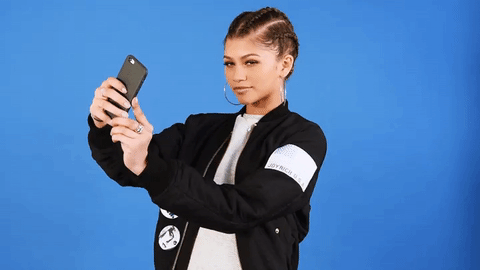
Rawpixel.com / Shutterstock.com
Everyone knows that Facebook is a place where you can post photos and status updates of your everyday life for your friends to see. Most people know that LinkedIn is the Facebook of the professional world, and if you’re lucky, it’ll help you get a job. But for students who follow more creative pursuits—say, photography, writing, or cooking—there isn’t just one social networking site for showcasing images, stories, or recipes. In fact, an aspiring photographer could choose to post photos on a personal Facebook page, on a Group page, or on an Artist page. And those are only the choices for Facebook!
There are many other ways to highlight your hobbies and passions on social media, and if you’re good enough, it may be something you want to share with an admissions counselor or a prospective employer when the time comes.
The Obvious Ones
Facebook. Snapchat. Twitter. Instagram. Youtube. When I was growing up, none of these words even existed in the context that they’re used today, but now they’re used in everyday conversation. In March 2016, an average of over one billion people were active on Facebook each day. DJ Khaled gets two million views each time he posts a Snapchat. Combined, internet users watch multiple millions of hours of Youtube videos every day. Justin Bieber was actually discovered via Youtube. Social networking sites like these, then, can make a difference.

Zendaya / Giphy
I’m not saying that you’re going to get discovered by a talent agency and signed to a record label if you post videos of yourself singing on Youtube. I’m not even saying that you’ll get any views or likes on your Instagram, not even when you tag the picture #dogsofinstagram. What I am saying is this: If you have a talent that you would like to showcase, there’s no better way to potentially reach billions of people than by using the internet. Here’s an example. Let’s say that you’re really into writing poetry, so you decide to start a WordPress blog. You share it with your friends and promote it on your Facebook, and then maybe your friends do the same. Pretty soon your material is reaching people you’ve never met. Cool, right?
It’s wise to remember that your participation in online communities can affect your chances of being offered a job or admission into college. Public posts full of swearing and videos of underage partying are an obvious deal breaker when it comes to getting an interview or an acceptance. Instead, concentrate on tailoring your online presence to highlight your strengths.
Make sure that you know what pops up when someone types your name into a search engine. After all, it is potentially the first thing admissions committees and employers will see about you. You might decide to maintain a private personal social media account and create a public Facebook page for your music or photography, a public Youtube channel for your music, or a public Instagram devoted to your fashion design ideas and samples. This way, your talents can speak for themselves.
The Not-So Obvious Ones

violetkaipa / Shutterstock.com
DeviantArt: Artists of any sort can create an account to share images of their works with the online community of DeviantArt. Users can create an online portfolio of their work, view and comment on other artists’ works, create a collection of favorites, and write journal entries. Works don’t have to be two-dimensional, provided you can take a representative photograph of your 3D art.
Dribbble: Students who are interested in graphic or web design may be more interested in creating an account with Dribbble. Like DeviantArt, Dribbble users create a portfolio of images showcasing their work to others, who may choose to comment on an image. There are also job listings, showing both designers who are available for hire and jobs that are hiring designers.
Flickr: Flickr allows users to open free accounts for uploading photos and videos to online albums. Users can decide if they want their photos or videos to be public or private. If they choose to keep their work private, they can also specify with whom they want to share it. On the other hand, anyone can view, like, favorite, and comment on public photos and follow the corresponding artists.
HitRecord: HitRecord is a collaborative community of artists, both visual and text, who work together to create new media. The website offers challenges, where individuals can answer a challenge posed by another person. One person can write a song with music, for example, and challenge someone else to sing and record it. All of the media uploaded to the site is available for other users to download and edit. Finished products, as chosen by the director of the company, may go on to make money, which is then returned to any contributing artists.
SoundCloud: SoundCloud is used primarily for the sharing of audio clips. The basic, free account gives users three hours of storage for their uploaded music, while SoundCloud Pro (which costs $7.00 monthly) gives users six hours of storage, the ability to highlight certain recordings, and statistics about who is listening. For an additional $8.00 monthly, users will have no time limit to their uploads. Users can explore, listen to, and buy music that is being uploaded by artists.

Ollyy / Shutterstock.com
Stage32: Stage32 is like the Facebook of the acting world. Not only does it connect actors, producers, animators, screenwriters, and directors, but it also hosts a job board and listings for online educational opportunities (which may or may not be free). Additionally, it provides a way for artists to pitch their screenplays and promotional materials to professional executives in the movie, television, and theater industries. Users who are interested in meetups can explore local events.
Vimeo: Vimeo is similar to SoundCloud, but instead of uploading, sharing, and watching audio clips, users are instead focused on videos. Without an account, users can watch videos, but users must have an account to interact (like, comment, favorite, follow). The basic, free account gives users the ability to upload 500MB of videos each week, but if users want more uploading and storage capabilities, they’ll have to upgrade to a paid account.
Blogging Platforms
If the written word is more your thing, you may want to consider starting a blog. You can write about anything your heart desires: humor, cars, cooking, what it’s like to be a teenager, poetry, short stories, etc. Since you’ll be publishing original material online, you should look up the copyright policies of your blog platform, publish a copyright notice forbidding readers to reappropriate your material as their own or publish it without your permission, and obtain a Creative Commons License.
WordPress, Blogger, and SquareSpace are some of the most widely used blogging platforms. Both WordPress and Blogger allow users to host a blog on their websites for free, are user-friendly, and provide customizable designs. SquareSpace offers users a free trial but requires payment after the trial expires; websites come as low as $12.00 each month.
The Big Picture: If you take care to make sure that your personal work is protected or copyrighted or if you don’t care about the copyright so much as the collaboration and the feedback, joining one of these artistic networking sites may not be a bad idea. If you want to show off work to family and friends, Instagram and Facebook may be better, though less professional options. Take your time, hone your craft, and share your work! Who knows! It might tip an admissions decision in your favor.
-
Fresh Grads: Tips to Jump-Start Your Job Search
-
The Three Building Blocks That Make up a Stellar Résumé
-
A Survival Guide for Students Who Have to Work on Black Friday
-
How to Turn Your Hobby into a Résumé Boost
-
The Five Most Versatile Majors (and Why It’s Okay if Your Career Isn’t Related to Your Degree)
-
Six Companies that Offer Tuition Assistance to Their Employees
-
Tips for Acing Your Skype Interview
-
Majors and Careers with Jobs in Any City
-
Why Résumé Padding Doesn’t Always Work
-
Public Speaking: How to Use Your Voice to Climb to Success
-
How to Go about Choosing the Right Major
-
How to Turn Your Internship into A Job Offer

